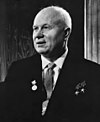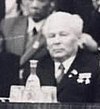User:RexxS/List of leaders of the Soviet Union
List[edit]
This list includes only those persons who were able to gather enough support from the Communist Party of the Soviet Union (CPSU) and the government, or one of these to rule the Soviet Union.
| Name (Birth–Death) |
Portrait | Term of office | Congress | Notes |
|---|---|---|---|---|
| Vladimir Lenin (1870–1924)[1] |
8 November 1917[1] – 21 January 1924[2] | 1st—12th Congress | Chairman of the Council of People's Commissars and informal leader of the Bolsheviks since their inception.[1] Was leader of the Russian Soviet Federative Socialist Republic (RSFSR) until the founding of the Union of Soviet Socialist Republics (USSR) in 1922.[3] | |
| Joseph Stalin (1878–1953)[2] |
3 April 1922[2] – 5 March 1953[4] | 13th—19th Congress | General Secretary of the Central Committee of the All-Union Communist Party of Bolsheviks from 3 April 1922 until the office of general secretary was abolished in 1934.[5] From 1934 to 5 March 1953 he was a Secretary of the Central Committee (CC). He served as Chairman of the Council of Ministers of the USSR from 6 May 1941 until his death on 5 March 1953.[4] He also held the post of the Ministry of Defense of the USSR from 19 July 1941 to 3 March 1947 and Chairman of the State Defense Committee during the Great Patriotic War[6] and became the only one to hold the office of People's Commissariat of Nationalities from 1921–1923.[7] | |
| Georgy Malenkov (1902–1988)[8] |

|
5 March 1953[9][8] – 13 March 1953[10] | — | Malenkov served as First Secretary of the Central Committee of the Communist Party of the Soviet Union but left after taking the position of Premier, which lasted from 6 March 1953[11] to 8 February 1955.[12] |
| Troika[9] | 13 March 1953[9] – 26 June 1953[13] | — | This Troika consisted of Georgy Malenkov, Lavrentiy Beria, and Vyacheslav Molotov[14] and lasted until the death of Beria.[15] | |
| Nikita Khrushchev (1894–1971)[15] |

|
7 September 1953[15] – 14 October 1964[16] | 22nd—25th Congress | Served as First Secretary of the Central Committee of the Communist Party of the Soviet Union and Chairman of the Council of Ministers of the USSR from 27 March 1958 to 14 October 1964. Khrushchev was removed from power after a trip to Scandinavia by Leonid Brezhnev and his supporters.[17] |
| Troika[16] | 14 October 1964[16] – 16 June 1977[18] | 23rd—25th Congress | The Troika consisted of Leonid Brezhnev as First Secretary, Alexei Kosygin as Premier and Anastas Mikoyan as Chairman of the Presidium of the Supreme Soviet of the USSR. Mikoyan retired from politics in 1965 and was replaced by Nikolai Podgorny. During Brezhnev's gradual consolidation of power, the Troika was dissolved when Brezhnev took became the Chairman of the Presidium of the Supreme Soviet in 1977.[18] | |
| Leonid Brezhnev (1906–1982)[16] |

|
14 October 1964[16] – 10 November 1982[19] | 23rd—26th Congress | Served as First Secretary of the Central Committee of the Communist Party, was later re-named General Secretary,[20] and later Chairman of the Presidium.[18] |
| Yuri Andropov (1914–1984)[21] |

|
12 November 1982[21] – 9 February 1984[22] | — | General Secretary of the Central Committee of the Communist Party[23] and Chairman of the Presidium from 16 June 1983 to 9 February 1984.[24] |
| Konstantin Chernenko (1911–1985)[25] |

|
13 February 1984[25] – 10 March 1985[20] | — | General Secretary of the Central Committee of the Communist Party[26] and Chairman of the Presidium from 11 April 1984 to 10 March 1985.[27] |
| Mikhail Gorbachev (1931–present)[20] |

|
11 March 1985[20] – 25 December 1991[28] | 27th—28th Congress | Served as General Secretary of the Central Committee of the Communist Party from 11 March 1985,[27] and resigned on 24 August 1991[29], Chairman of the Presidium of the Supreme Soviet of the USSR from 1 October[26] 1988 until the office was re-named to the Chairman of the Supreme Soviet of the USSR on 25 May 1989 to 15 March 1990[27] and President of the Soviet Union from 15 March 1990[30] to December 25, 1991[31] when he resigned as President, the following the day the Soviet Union was formally dissolved.[28] |
References[edit]
- ^ a b c Brown 2009, p. 53.
- ^ a b c Brown 2009, p. 59.
- ^ Sakwa, Richard (1999). The Rise and Fall of the Soviet Union, 1917–1991: 1917–1991. Routledge. pp. 140–143. ISBN 9780415122900.
- ^ a b Service 2009, p. 323.
- ^ Service 2009, p. 325.
- ^ Green, William C.; Reeves, W. Robert (1993). The Soviet Military Encyclopedia: P–Z. University of Michigan: Westview Press. p. 196. ISBN 0813314321.
{{cite book}}: CS1 maint: multiple names: authors list (link) - ^ Service, Robert (2005). Stalin: A Biography. Harvard University Press. p. 154. ISBN 0674016971.
- ^ a b Service 2009, p. 331.
- ^ a b c Service 2009, p. 332.
- ^ Cite error: The named reference
doneforwas invoked but never defined (see the help page). - ^ L. Hill, Kenneth (1993). Cold War chronology: Soviet–American relations, 1945–1991. University of Michigan: Congressional Quarterly. p. 61. ISBN 0871879212.
- ^ A. Cook, Bernard (2001). Europe since 1945: an encyclopedia, Volum 1. Taylor & Francis. p. 163. ISBN 0815340575.
- ^ Andrew, Christopher; Gordievsky, Oleg (1990). KGB: The Inside Story. HarperCollins Publishers. pp. 423–424. ISBN 0-06-016605-3.
{{cite book}}: CS1 maint: multiple names: authors list (link) - ^ Marlowe, Lynn Elizabeth (2005). GED Social Studies: The Best Study Series for GED. Research and Education Association. p. 140. ISBN 0738601276.
- ^ a b c Taubman 2003, p. 258.
- ^ a b c d e Service 2009, p. 377.
- ^ Service 2009, p. 376.
- ^ a b c Brown 2009, p. 402.
- ^ Service 2009, p. 426.
- ^ a b c d Service 2009, p. 378.
- ^ a b Service 2009, p. 428.
- ^ Service 2009, p. 433.
- ^ Cite error: The named reference
Brown 2009, p. 403was invoked but never defined (see the help page). - ^ Paxton 2004, p. 234
- ^ a b Service 2009, p. 434.
- ^ a b Europa Publications Limited (2004). Eastern Europe, Russia and Central Asia. Routledge. p. 302. ISBN 1857431871.
- ^ a b c Paxton 2004, p. 235
- ^ a b Gorbachev, Mikhail (1996). Memoirs. University of Michigan: Doubleday. p. 711. ISBN 0385480199.
- ^ Service 2009, p. 503.
- ^ Paxton 2004, p. 236
- ^ Paxton 2004, p. 237
